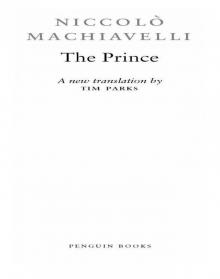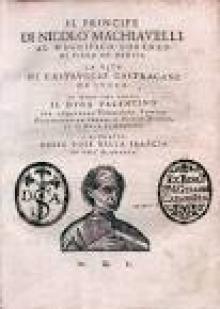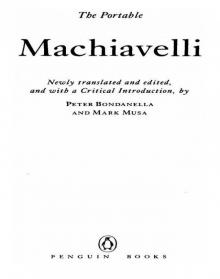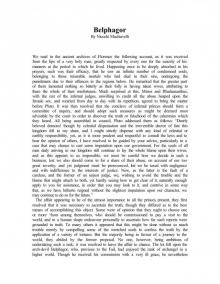- Home
- Niccolo Machiavelli
The Prince
The Prince Read online
Table of Contents
Title Page
Copyright Page
Introduction
Chapter 1 - Different kinds of states and how to conquer them
Chapter 2 - Hereditary monarchies
Chapter 3 - Mixed monarchies
Chapter 4 - Conquered by Alexander the Great, the Kingdom of Darius did not ...
Chapter 5 - How to govern cities and states that were previously self-governing
Chapter 6 - States won by the new ruler’s own forces and abilities
Chapter 7 - States won by lucky circumstance and someone else’s armed forces
Chapter 8 - States won by crime
Chapter 9 - Monarchy with public support
Chapter 10 - Assessing a state’s strength
Chapter 11 - Church states
Chapter 12 - Different kinds of armies and a consideration of mercenary forces
Chapter 13 - Auxiliaries, combined forces and citizen armies
Chapter 14 - A ruler and his army
Chapter 15 - What men and particularly rulers are praised and blamed for
Chapter 16 - Generosity and meanness
Chapter 17 - Cruelty and compassion. Whether it’s better to be feared or loved
Chapter 18 - A ruler and his promises
Chapter 19 - Avoiding contempt and hatred
Chapter 20 - Whether fortresses and other strategies rulers frequently adopt ...
Chapter 21 - What a ruler should do to win respect
Chapter 22 - A ruler’s ministers
Chapter 23 - Avoiding flatterers
Chapter 24 - Why Italian rulers have lost their states
Chapter 25 - The role of luck in human affairs, and how to defend against it
Chapter 26 - An appeal to conquer Italy and free it from foreign occupation
Glossary of Proper Names
THE PRINCE
NICCOLÒ MACHIAVELLI (1469-1527) was born in Florence. He served the Florentine republic as a secretary and second chancellor, as ambassador and foreign policy maker, but when the Medici family returned to power in 1512 he was suspected of conspiracy, imprisoned and tortured, and forced to withdraw from public life. His most famous work, The Prince, was written in an attempt to gain favor with the Medicis and return to politics.
TIM PARKS was born in Manchester in 1954 and moved to Italy in 1981, where he has lived ever since. He has written eleven novels including Europa, Destiny, Cleaver, and, most recently, Dreams of Rivers and Seas, as well as a history of the Medici bank in fifteenth-century Florence, Medici Money. He lectures on literary translation in Milan and his many translations from the Italian include works by Moravia, Tabucchi, Calvino, and Calasso.
PENGUIN BOOKS
Published by the Penguin Group
Penguin Group (USA) Inc., 375 Hudson Street, New York, New York 10014, U.S.A.
Penguin Group (Canada), 90 Eglinton Avenue East, Suite 700, Toronto,
Ontario, Canada M43P 2Y3 (a division of Pearson Penguin Canada Inc.)
Penguin Books Ltd, 80 Strand, London WC2R 0RL , England
Penguin Ireland, 25 St Stephen’s Green, Dublin 2, Ireland (a division of Penguin Books Ltd)
Penguin Group (Australia), 250 Camberwell Road, Camberwell,
Victoria 3124, Australia (a division of Pearson Australia Group Pty Ltd)
Penguin Books India Pvt Ltd, 11 Community Centre, Panchsheel Park, New Delhi - 110 017, India
Penguin Group (NZ), 67 Apollo Drive, Rosedale, North Shore 0632,
New Zealand (a division of Pearson New Zealand Ltd)
Penguin Books (South Africa) (Pty) Ltd, 24 Sturdee Avenue,
Rosebank, Johannesburg 2196, South Africa
Penguin Books Ltd, Registered Offices:
80 Strand, London WC2R 0RL , England
This translation first published in Great Britain by Penguin Books (UK) 2009
Published in Penguin Books (USA) 2009
Translation and editorial material copyright © Tim Parks, 2009
All rights reserved
eISBN : 978-1-101-15950-7
CIP data available
The scanning, uploading and distribution of this book via the Internet or via any other means
without the permission of the publisher is illegal and punishable by law. Please purchase only
authorized electronic editions, and do not participate in or encourage electronic piracy
of copyrighted materials. Your support of the author’s rights is appreciated.
http://us.penguingroup.com
Introduction
Necessity. Must. Have to. Inevitably. Bound to. These are the words that recur insistently throughout The Prince. And then again: success, victory, prestige, achievement, and, on the other hand: loss, failure, defeat, death. These opposites are linked together by an almost obsessive use of because, so that, hence, therefore, as a result, as a consequence. From start to finish we have a vision of man manoeuvring precariously in a suffocating net of cause and effect. What is at stake is survival. Anything extra is luxury.
The Prince was written by a forty-four-year-old diplomat facing ruin. After fourteen years of influence and prestige, a change of regime had led to his dismissal. Suspected of conspiring against the new government, he was imprisoned and tortured. The rapid reversal of fortunes could not have been more devastating. Found innocent and released, he left town to live with his wife and family on a small farm. For a worldly man and compulsive womanizer, used to being at the frenetic heart of public life, this too felt like punishment. Idle and bitter, he tramped the hills by day and, in the long, empty evenings, began to write down some considerations on how to win power and, above all, how to hold on to it, how not to be a victim of circumstance. The result was a slim volume that would be a scandal for centuries.
Niccolò Machiavelli was born in Florence in 1469, the same year Lorenzo de’ Medici (il Magnifico) came to power. First male child after two daughters, Niccolò would grow up very close to his father, Bernardo, an ex-lawyer, mostly unemployed, with good contacts but no significant wealth or influence. If the son was to rise in the world, and he was determined to do so, he would have to count on his own wits and charm. Niccolò’s younger brother, Totto, chose not to compete and went into the priesthood. The boys’ mother, it should be said, was an extremely devout woman, a writer of religious poems and hymns. Their father on the other hand was sceptical, more at home with the sober works of Latin antiquity than the Bible. Niccolò may have taken his writing skills from his mother, but over divisions on religion he stood with his father and the Roman historians.
One says of Lorenzo il Magnifico that he ‘came to power’, but officially Florence was a republic and since Lorenzo was only twenty years old in 1469 he was far too young to hold elected office; an explanation is required. When, in the thirteenth century, the Florentines had thrown out the noble families who used to run the town, they introduced a republican constitution of exemplary idealism. A government of eight priori led by one gonfaloniere, or prime minister, would be elected every two months by drawing tags from a series of bags containing the names of well-to-do men from different guilds and different areas of town. This lottery would allow each major profession and each geographical area to be adequately and constantly represented. Every individual (of a certain social standing) could expect a brief share of power in order that no one could ever seize it permanently.
The system was unworkable. Every two months a new government might take a different position on key issues. The potential for instability more or less obliged whichever family was in the ascendant to step in and impose continuity. From 1434 on, the Medicis - first Cosimo, then Piero, then Lorenzo - had been manipulating the electoral process to make sure that most of the names in the
bags were friendly to themselves and that all of those actually selected for government would toe the Medici line. Hence, although the Florentines still liked to boast that they were free citizens who bowed the knee to no man, by the mid-fifteenth century they were in fact living in something very close to a dictatorship. When the rival Pazzi family tried to assassinate Lorenzo in the Duomo in April 1478, it was because they saw no legitimate way of putting him in his place as an ordinary citizen. Machiavelli thus grew up in a society where the distance between how things were actually run and how they were described as being run could not have been greater. He was close to his ninth birthday when the captured Pazzi conspirators, one an archbishop, were hung upside down from the high windows of the city’s main government building and left there for weeks to rot. He would have understood very young the price of getting it wrong in politics.
The young Machiavelli might also have had reason to doubt that there was any meaningful difference between matters of religion and matters of state. The pope had backed the Pazzi conspiracy, priests had been involved in the assassination attempt and Lorenzo was excommunicated after it failed; the religious edict was a political tool. A war between Florence and Rome ensued and the hostility only ended in 1480 when Turkish raids on the southern Italian coast prompted a rare moment of unity in the peninsula. Years later, Lorenzo would so ingratiate himself with a new pope as to get his son Giovanni made a cardinal at age thirteen. From excommunication to pope’s favourite was quite a change of fortune and once again it was more a matter of politics than of faith. Nothing, it appeared, was beyond the reach of wealth and astute negotiation.
At this point Machiavelli was twenty-one. We know very little of his early adult life, but one thing he definitely did at least once was to listen to the fiery preacher Girolamo Savonarola, head of the influential monastery of San Marco. Savonarola’s was a different kind of Christianity: rather than the corrupt, pleasure-conscious world of the papacy, whose decadence had offered no resistance to the rise of Humanism, this austere monk represented an early manifestation of what we have come to call fundamentalism, a return to the biblical text as the sole authority on earth and a vision of the Church as embattled and defensive in a world increasingly interested in values that had little to do with the gospel story. With great conviction, Savonarola preached the virtues of poverty, advocated the burning of any book or work of art that was impure and prophesied doom for the sinful Florentines in the form of a foreign invasion. In 1494 his prophesy came true.
To get any grasp of Machiavelli’s diplomatic career and the range of reference he draws on in The Prince, one must have some sense of the complicated political geography of Italy in the fifteenth and early sixteenth centuries, and of the profound change that occurred in the 1490s, a change that would determine Italy’s fate for the next 350 years.
For most of the fifteenth century there had been five major players in the peninsula: the Kingdom of Naples, the Papal States, Florence, Venice and Milan. Extending from just south of Rome to the southernmost tip of Calabria, the Kingdom of Naples was by far the largest. Wedged in the centre, with only precarious access to the sea, Florence was the smallest and weakest.
All five powers were in fierce competition for whatever territory they could take. Having lost much of their overseas empire to the Turks, the Venetians were eager to expand inside the northern Italian plain (Ferrara, Verona, Brescia) and down the Adriatic coast (Forlì, Rimini). Conscious of the size and power of a now unified France to the north, Milan hoped for gains to the south and west (Genoa) as a counterweight. Florence simply tried to get bigger in any way that was convenient. Over the previous century the Florentines had captured Arezzo, Pisa and Cortona and wasted huge energies in a series of failed attempts to conquer Lucca.
Rome’s aim under any pope was always to expand north and east into Romagna and Emilia, with a view to swallowing up Perugia, Bologna, Rimini and Forlì, a project that would bring it into conflict with both Venice and Florence. In the far south, Naples was governed by a branch of the house of Aragon, but the crown was contested by the Angevin kings of France and by the Spanish royal family (also Aragons) which already ruled Sicily.
So the scenario was complicated. Scattered between the large states were at least a score of smaller ones, some no bigger than a town and the surrounding fields, and all constantly under threat of invasion from one enemy or another. However, if the situation was rarely static, it is also true that there were few major changes. As soon as one power achieved some significant military victory, the others immediately formed an alliance against it to halt its progress. Florence, in particular, owed its continuing independence largely to the fact that if Venice, Milan or Rome tried to take it, the other two would at once intervene to prevent this happening. So for more than a hundred years a certain balance of power had been kept. All this ended with the French invasion of 1494.
The invasion was, as Machiavelli himself explains in The Prince, largely the Italians’ own fault. For some time the five states had been in the habit of frightening each other with the threat of foreign intervention. During the war against Rome and Naples in 1480, Florence had invited the French king to pursue his claim to the throne of Naples more actively. In 1482, during a Venetian assault on Ferrara, Florence and Milan had encouraged the Turks to step up their attacks on Venice’s maritime possessions. Venice had replied by inviting the Duke of Orleans to pursue his claim to Milan. In a war against Naples in 1483, Pope Innocent VIII had reminded the Duke of Lorraine that he too had a claim to the southern kingdom and invited him to send troops.
There was an element of bluff and brinkmanship in these threats, but in 1494 when King Charles VIII of France accepted Milan’s invitation to make good his claim to the crown of Naples, the bluff was called. Charles marched south with an army far larger than any Italians had seen in living memory. From that moment on, the peninsula would not be free from foreign intervention until the completion of the Risorgimento in 1870. Struggling to hold Naples, the French would invite in the Spanish from Sicily to split the kingdom with them, and the Spanish, after Charles I of Spain inherited the crown of the Holy Roman Empire, would eventually push France back north of the Alps, put Rome to the sack and dominate Italy for 150 years.
But that is to leap ahead. In 1494, when the French first marched through Lombardy heading for Naples, Florence was directly in their path and, what’s more, an ally of Naples. At this point Lorenzo il Magnifico had been dead for two years and the Medici regime was led by his incompetent son, Piero. So abject was Piero’s capitulation to Charles, so spineless his decision simply to surrender the city’s dependent territories, that the Florentines rebelled against him. The Medici regime collapsed and very soon the preacher who had been prophesying this disaster was made gonfaloniere, first minister, this time on a yearly, rather than a two-monthly, basis.
Girolamo Savonarola ruled Florence from 1494 to 1498, during which time the city passed from being one of the centres of Renaissance Humanism to a book-burning, fundamentalist theocracy. Realizing that Savonarola’s claim to be God’s prophet was a far greater threat to its authority than any Humanism, scepticism or eclecticism, the Church in Rome did everything possible to bring about his downfall and in 1498, having lost much of his support in Florence, the preacher was convicted of heresy and burned at the stake. It was shortly after these dramatic events that Niccolò Machiavelli succeeded in getting himself elected to the important positions of Secretary of the Second Chancery (one of two key state departments in Florence) and, soon afterwards, Secretary of the Ten of War, a committee that dealt with foreign relations and war preparations.
Machiavelli was twenty-eight. We have no idea how he arrived at such appointments at this early age. There is no record of any special experience that would warrant such confidence in his abilities. But within months he was travelling to neighbouring states to represent Florence’s interests, and over the next fourteen years he would be involved in important, often long-drawn-
out missions to the King of France, the pope, the Holy Roman Emperor, Cesare Borgia, Caterina Sforza and many others. In between these missions he was frequently and very actively engaged in Florence’s ongoing military campaign to re-take Pisa, which had regained its independence during the French invasion. Pisa was crucial to Florentine commerce in that it gave the town an outlet to the sea.
Introductions to The Prince generally play down Machiavelli’s abilities as a diplomat, presenting these years as useful only in so far as they offered him the material he would draw on for his writing after he had lost his position. Machiavelli would not have seen things that way. For more than a decade he was Florence’s top diplomat and proud to be so, and if the missions he undertook did not produce spectacular results this was largely because he was representing the weakest of the main states in Italy in a period of particular confusion and vulnerability that would eventually see four foreign powers militarily involved in the peninsula: France, Spain, the Holy Roman Empire and Switzerland.
Savonarola had taken Florence towards an alliance with France; the priest’s successors followed the same policy, but without any clear vision of how the city might achieve stability and security in the long term. To make matters worse, having decided in 1502 that their gonfaloniere, or first minister, should be elected for life, the Florentines gave the job to Piero Soderini, an honourable man but chronically incapable of making any kind of bold decision. Machiavelli’s diplomatic career was thus mostly taken up in attempts to persuade surrounding and threatening states to leave Florence alone and not to expect financial or military help from her for their wars elsewhere; that is, as far as there was a discernible, long-term policy it was one of prevarication. Far from home, Machiavelli would frequently receive contradictory orders after he had already started negotiating. Arriving in foreign towns, he would find that his expense allowance wasn’t sufficient to pay couriers to take his messages back to Florence. Sometimes he could barely afford to feed and clothe himself. Such was the contempt of the more powerful monarchs that he was often obliged to wait days or even weeks before being granted an audience.

 The Prince
The Prince Valentino
Valentino The Portable Machiavelli
The Portable Machiavelli History of Florence and of the Affairs of Italy
History of Florence and of the Affairs of Italy Belphagor
Belphagor